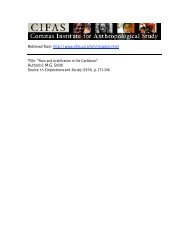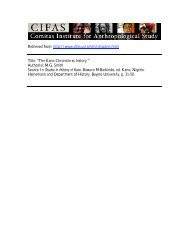e - CIFAS
e - CIFAS
e - CIFAS
Create successful ePaper yourself
Turn your PDF publications into a flip-book with our unique Google optimized e-Paper software.
a6<br />
GOVERNMENT IN ZAZZAU<br />
roles to redefine, abolish, or reconstitute the former political system,<br />
as well as the simple replacement ofpersonnel. Either of these<br />
alternatives may endanger the atability of the pre-existing system,<br />
and eitherofthese developments is likely in proportion to the overlap<br />
of administrative and political functions within the system.<br />
Hence the importance which is attached to the explicit differentiationand<br />
mutual insulation of these activities within cenainsystems<br />
of government, as a precondition of the continuity of these<br />
systems: and hence also the critical analytic value ofthese differentiations,<br />
and of the relations between the administrative and<br />
political systems in the comparative study of government.<br />
Al!. indicated above, administrative authority and structures are<br />
differentiated from. political action by rules and procedures which<br />
govern and detail the conditions of administrative action, its func~<br />
tions and tasks. No comparable framework of roles positivdy defines<br />
or limits the scope and functions of political activity. In<br />
English law, this point is expressed in the principle that the Crown<br />
cannot bind itself. In effect this means that Parliament cannot act<br />
ultra wes, whereas administrative agents obviously can, frequently<br />
do, and are often reprimanded for such action. The British rule<br />
against civil servants indulging in political action is a simple<br />
corollary of the preceding principle.<br />
To point this up, let us consider briefly conditions such as<br />
conquest, rebellion, or revolution. In any of these situations<br />
governing power is appropriated on the basis of force. In all such<br />
situations, the appropriation of power is illegitimate, in the sense<br />
that it is inconsistent with the conditions of legitimacy which de~<br />
fine thesystem ofgovenunentoverthrown. Inthe case ofconquest,<br />
the governing power is appropriated by an external group, whose<br />
rights to govern if previously admitted would have made the conquest<br />
unnecessary. In the case of rebellion or revolution, the same<br />
point holds, although the appropriators are themselves members of<br />
the unit. In either of these events, governments are constituted on<br />
bases which do not adhere to previous conditions oflegitimacy, but<br />
do reflect the distributions of power. In either ofthese events, the<br />
pre-existing authority structure may be retained or revised or replaced.<br />
These situations show clearly how self-defeating it is to<br />
conceive ofgovernment either in terms of authority or in terms of<br />
legitimate power solely.<br />
Such consequences follow from the fact that aU political action<br />
" THE NATURE OF GOVERNMENT a7<br />
'{and any political system is, by its very nature as a mode ofcompeti<br />
",tion, inherently segmentary in process and form. Segmentation as<br />
?tbccharacteristic way inwhich political relations are expressedand<br />
·;';develop is implicit in the definition of these relations by the com<br />
:petition for power, and also in the definition of a political system<br />
lISa system ofsuch competition. Competitionofthis sortnecessarily<br />
involves the contraposition of co-ordinate units at any level, and<br />
units are defined as co-ordinate by virtue of their competition.<br />
The composition of competing political units varies widely from<br />
one society to another, and this variation provides an important<br />
reference point in the comparative study ofgovernmental systems,<br />
as we shall set. Moreover, within any society, the composition of<br />
co-ordinate political units will vary as a function of the issue,<br />
occasion, and situation with respect to whichthey are mobilized, in<br />
much the same way as happens in lineage systems where segmentary<br />
organization and processes were first studied in detail directly.<br />
As a general rule the more variable the constitution of segmentary<br />
political units, the greater the degree of social differentiation, and<br />
the more complex the system of government.<br />
(li!) Centrali:ration and Decentralization<br />
Political action has been defined in terms of policy-making processes,<br />
and these are further defined by the fact that they involve<br />
decisions which can neither be subject to authority nor allocated as<br />
simple rights. Such processes provide a field within which administrative<br />
and political systems often overlap. Under certain<br />
conditions initially administrative functions may come to have a<br />
primarily political significance in consequence of their policymaking<br />
capacities. No code of administrative procedure can be<br />
devised which wilt lay down in advance rules governing the actions<br />
ofits agents under all possible circumstances; and no administrative<br />
code can of itself guarantee faithful reports from subordinates, or<br />
vigilant and impartial supervision by superiors. Inevitably, administration<br />
is confronted by situations in which the administrator<br />
must either act first and seek authority after, or enjoys opportunities<br />
for ultra vires action which his superior may never know<br />
fully about. 1 Inevitably, also, at any level of an administrative<br />
1 This. includu the opportunity for Ildmini&tnrtive officeu to influ~ the<br />
deciaions taken by thOBe who hold power. Indeed, the senior echelons of an<br />
expanding bUIeIl-UCnlCY may lIOmetimes openly claim that their fLJnCtions include<br />
the formation and guidance of policy.





